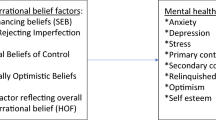Abstract
One hundred and thirty-three employees (58 males, 75 females) of the Department of Veterans Affairs Medical Center (DVAMC), Coatesville, PA anonymously volunteered data on a Demographic Survey, The Brief Symptom Inventory (BSI, Derogatis), and The Irrational Beliefs Test (IBT, Jones). A canonical correlation analysis was used to investigate associations between general patterns of beliefs and symptomatology. Two significant pairs of variates were revealed. The first pair provided associations between Demand for Approval, High Self-Expectations, Frustration Reactive, Anxious Overconcern, and Perfectionism and psychological symptomatology. The second pair provided associations between Demand for Approval, Blame Proneness, Frustration Reactive, and Emotional Irresponsibility and somatic symptoms. A MANOVA was used to assess for gender differences. There was no significant general gender effect. However, univariate analyses revealed significant effects for seven BSI variables. This study supported the belief that one's pattern of thinking is related to one's pattern of symptomatology. This has implications for use in health psychology and behavioral medicine.
Similar content being viewed by others
References
Alimena, D. W. (1991).Exploring the relationships between physiological and psychological measures of well-being (mind, body). Unpublished doctoral dissertation, Temple University, Philadelphia, PA.
Beck, A.T. (1967).Depression: Clinical, experimental and theoretical aspects. New York: Hoeber.
Burns, D.D. (1980)Feeling good: The new mood therapy. New York: William Morrow and Company, Inc.
Burns, D.D. (1989).The feeling good handbook. New York: William Morrow and Company, Inc.
Derogatis, L.R. (1993).The Brief Symptom Inventory: Administration scoring and procedures manual (Third Edition). Minneapolis, MN: National Computer Systems, Inc.
Derogatis, L.R., & Cleary, P. (1977). Confirmation of the dimensional structure of the SCL-90: A study of construct validation.Journal of Clinical Psychology, 33, 981–989.
Eastwood, M.R., & Trevelyn, M.H. (1972). Relationship between physical and psychiatric disorder.Psychological Medicine, 2, 363–372.
Ellis, A. (1962).Reason and emotion in psychotherapy. New York: Stuart.
Ellis, A. (1989). Rational-emotive therapy. In R.J. Corsini & D. Wedding (Ed.),Current psychotherapies (pp. 197–238), Itasca, IL: Peacock.
Jones, R.G. (1969).A factored measure of Ellis' irrational belief system with personality and maladjustment correlates. (Doctoral Dissertation, Texas Technical College).Dissertation Abstracts International, 69, 6443.
Joseph, S., Yule, W., & Williams, R. (1993) Post-Traumatic Stress: Attributional aspects.Journal of Traumatic Stress, 6(4), 501–513.
Kreitler, S., & Kreitler, H. (1991). Cognitive orientation and physical disease or health.European Journal of Personality, 5(2), 109–129.
Lazarus, R.S. (1990). Stress, coping, and illness. In H.S., Friedman (Ed.),Personality and Disease (pp. 97–120). New York: Wiley-Interscience.
Sartorius, N., Goldberg, D., de Girolamo, Costa e Silva, J.A., Lecrubier, Y., & Wittchenm H.U. (Eds.). (1992).Psychological disorders in general medical settings. Toronto: Hogrefe & Huber Publishers.
Selye, H. (1976).Stress in health and disease. New York: Butterworth Publishers.
Solomon, G.F. (1987). An intensive psychoimmunologic study of long-surviving persons with AIDS.Annal of the New York Academy of Sciences, 496, 647–655.
Suter, S. (1986).Health psychophysiology: Mind-body interactions in wellness and illness. London: Erlbaum.
VandenBos, G.R., & DeLeon, P.H. (1988). The use of psychotherapy to improve physical health.Psychotherapy, 25(3), 335–343.
Woods, P.J. (1987). Reductions in Type-A behavior, anxiety, anger, and physical illness as related to changes in irrational beliefs: Results of a demonstration project in industry.Journal of Rational Emotive Therapy, 5, 213–237.
Woods, P.J., & Lyons, L.C. (1990). Irrational beliefs and psychosomatic disorders.Journal of Rational-Emotive & Cognitive-Behavior Therapy, 8(1), 3–20.
Author information
Authors and Affiliations
Rights and permissions
About this article
Cite this article
Howlett, B.A. An investigation of the relationship between general belief patterns and well-being. J Rational-Emot Cognitive-Behav Ther 12, 205–218 (1994). https://doi.org/10.1007/BF02354548
Issue Date:
DOI: https://doi.org/10.1007/BF02354548




